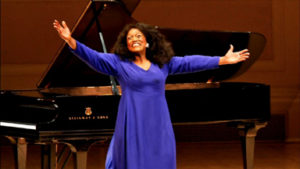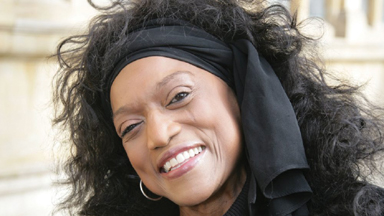 A multiple Grammy Award winner, she was a towering figure on operatic, concert and recital stages.
A multiple Grammy Award winner, she was a towering figure on operatic, concert and recital stages.
Jessye Norman performing in 1991 at the Concertgebouw in Amsterdam.CreditCreditFrans Schellekens/Redferns, via Getty Images
By Daniel J. Wakin and Michael Cooper
Jessye Norman, the majestic American soprano who brought a sumptuous, shimmering voice to a broad range of roles at the Metropolitan Opera and houses around the world, died on Monday in New York. She was 74.
The cause was septic shock and multiple organ failure following complications of a spinal cord injury she suffered in 2015, according to a statement by her family.
Ms. Norman, who also found acclaim as a recitalist and on the concert stage, was one of the most decorated of American singers. She won five Grammy Awards, four for her recordings and one for lifetime achievement. She received the prestigious Kennedy Center Honor in 1997 and the National Medal of Arts in 2009.
In a career that began in the late 1960s, Ms. Norman sang the title role in Verdi’s “Aida,” Wagner’s heroines, characters in Janacek, Poulenc, Bartok and Strauss operas, and Cassandre in “Les Troyens” by Berlioz, in which she made her Met debut in 1983. She went on to sing more than 80 performances at the Met. Its general manager, Peter Gelb, on Monday called her “one of the greatest artists to ever sing on our stage.”
Ms. Norman in her debut at the Metropolitan Opera in 1983 in the role of Cassandre in “Les Troyens” by Berlioz.CreditMetropolitan Opera
A keen interpreter as well as a magnificent singer, Ms. Norman had a distinctly opulent tone that sounded effortless, never pushed. It was especially suited to Wagner and Strauss.
In a review of a 1992 recital, Edward Rothstein of The New York Times likened her voice to a “grand mansion of sound.”
“It defines an extraordinary space,” he wrote. “It has enormous dimensions, reaching backward and upward. It opens onto unexpected vistas. It contains sunlit rooms, narrow passageways, cavernous halls. Ms. Norman is the regal mistress of this domain, with a physical presence suited to her vocal expanse.”
[Read our critic’s appraisal of Ms. Norman’s career, and listen to 10 of her greatest performances.]
As an African American, she credited other great black singers with paving the way for her, naming Marian Anderson, Dorothy Maynor and Leontyne Price, among others, in a 1983 interview with The Times.
“They have made it possible for me to say, ‘I will sing French opera,’” she said “or, ‘I will sing German opera,’ instead of being told, ‘You will sing “Porgy and Bess.” ’ Look, it’s unrealistic to pretend that racial prejudice doesn’t exist. It does! It’s one thing to have a set of laws, and quite another to change the hearts and minds of men. That takes longer. I do not consider my Blackness a problem. I think it looks rather nice.”
Ms. Norman in 1989 at the Concertgebouw in Amsterdam.CreditFrans Schellekens/Redferns, via Getty Images
A new production of “Porgy and Bess” is now playing at the Met; the house said it was dedicating Monday night’s performance to Ms. Norman.
In her memoir, “Stand Up Straight and Sing!” (2014), she recounted meeting instances of racism. “Racial barriers in our world are not gone, so why can we imagine that racial barriers in classical music and the opera world are gone?” she told The Times in 2014.
Ms. Norman was born into a musical family on Sept. 15, 1945, in Augusta, Ga., growing up there in a segregated but close-knit world. Her mother, Janie King Norman, was an amateur pianist; her father, Silas Norman Sr., was an insurance broker. Jessye especially enjoyed visiting her maternal grandparents, fascinated by one particular piece of furniture.
“My grandparents were the only people I ever knew who had one — a grand pedal organ, or more accurately, a harmonium — right there in their house,” she wrote in her memoir. “It lived over in the corner of the front room, and I remember thinking that it was the most exotic thing I had ever encountered in my entire life. As far as I can recall, we were never stopped from playing it, nor admonished for disturbing the adults.”
She began listening to opera on the radio as a child.
“I remember thinking that opera stories were not very different from other stories: a boy meets a girl, they fall in love, they cannot be together for some reason, and most of the time it does not end happily ever after,” she wrote. “For me, opera stories were grown-up versions of stories that were familiar to me already.”
She earned a bachelor’s degree in music from Howard University and studied at the University of Michigan and Peabody Institute. Her career received its first big boost when she won a first-place prize at the Munich International Music Competition in 1968. The next year, she made her debut on an opera stage at the Deutsche Oper Berlin in Wagner’s “Tannhäuser,” as Elisabeth.
Ms. Norman acknowledged an ovation at Carnegie Hall in May 2008.CreditRichard Termine for The New York Times
Appearances at the Teatro alla Scala in Milan, the Royal Opera House in London, and other major opera houses followed, and she quickly became one of the busiest opera divas on the scene, a fixture of galas and benefits. An accomplished recitalist, she made records of vocal works by Mahler, Debussy and Strauss.
She also ranged backward in time to the Baroque, displaying a remarkable command of a broad range of styles. She was famous for saying “pigeonholes are for pigeons.”
It was not until 1983 that she made a belated Met debut, opening the company’s centennial season singing the role of Cassandre in a starry revival of Berlioz’s “Les Troyens.” By all accounts she stole the show, winning over “Monday night’s audience and Tuesday morning’s critics,” as The Times reported in its account of her “triumph.”
She rose early the next day to appear on NBC’s “Today” show. “The only person in my family who couldn’t come on Monday was my mother, who is ill and at home in Georgia,’’ she said at the time. “‘I wanted to give her a look at me.”
Her imposing stage presence and large, voluptuous voice made her ideal for certain parts. When she sang the title character of Richard Strauss’s “Ariadne auf Naxos,” one of her defining roles, John Rockwell described her in The Times as “one of our most musicianly singers” and added: “She has just the right voice for this role: a smoothly knit-together soprano that reaches up from plummy contralto notes to a powerful fullness on top.”
In a sign of her international stature, Ms. Norman was tapped to sing “La Marseillaise” in Paris on the 200th anniversary of Bastille Day — which she did, in dramatic fashion, at the obelisk on the Place de la Concorde before an array of world leaders, wearing a grand tricolor gown designed by Azzedine Alaïa. She also sang at the second inaugurations of Ronald Reagan and Bill Clinton.
She became a major recording artist at the dawn of the compact disc era, leaving a rich catalog of opera, lieder, spirituals and recitals. One of her most acclaimed recordings was a classic account of Strauss’s “Four Last Songs,” backed by Kurt Masur and the Leipzig Gewandhaus Orchestra. “Her generous heart, dignified manner and noble voice seem ideally suited to Strauss’s valedictory utterances,” Gramophone wrote in its review.
In person she cut an imposing figure, dressing dramatically and speaking with a diva’s perfect diction. When she entered a room, heads turned. And even after she left the opera stage she remained a restless, probing artist — collaborating with the dancer, choreographer and director Bill T. Jones in 1999 on a piece called “How! Do! We! Do!’’ and later singing anarchic music by John Cage.
She was socially engaged. In 2003, Ms. Norman and the Rachel Longstreet Foundation created the Jessye Norman School of the Arts, a free after-school arts program in her native Augusta for underserved students. In October, that city will rename a street Jessye Norman Boulevard; she had planned to attend the ceremony.
Among her final projects was “Sissieretta Jones: Call Her By Her Name!,” a tribute to Jones, who in 1893 became the first African-American woman to headline a concert on the main stage of Carnegie Hall — and who had bristled at her stage name, “the Black Patti,” which compared her to the white diva Adelina Patti.
“Thirty years out of slavery for African-Americans in this country, here she was on the stage of Carnegie Hall,” Ms. Norman said in an interview last year.
Her survivors include a brother, James Norman, and a sister, Elaine Sturkey.
In her memoir, Ms. Norman recalled one of her own earliest stabs at singing opera in front of an audience. She was in junior high school when, at a teacher’s urging, she performed the aria “My Heart at Thy Sweet Voice” from Saint-Saëns’s “Samson and Delilah.” She had been singing it in English at church functions and supermarket openings, but for the school performance her teacher had her learn it in its original French.
“I do think that if you can stand up and sing in French in front of an assembly full of middle-schoolers,” Ms. Norman wrote, “then you can do just about anything.”
Daniel J. Wakin is an editor on the Obituary News Desk. He has been a reporter and editor in the Culture and Metro departments and has reported from three dozen countries. He is the author of “The Man With the Sawed-Off Leg and Other Tales of a New York City Block” (Arcade, 2018). @danwakin
Michael Cooper covers classical music and dance. He was previously a national correspondent; a political reporter covering presidential campaigns; and a metro reporter covering the police, City Hall and Albany. @coopnytimes • Facebook
A version of this article appears in print on Oct. 1, 2019, Section B, Page 11 of the New York edition with the headline: Jessye Norman, Regal American Soprano and Met Opera Luminary, Dies at 74.

